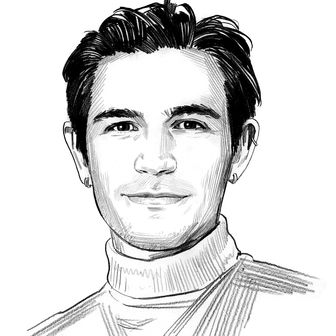
Don’t blame Chloe Flower. The composer and musician, who plays and writes her own music, took on an inaugural role at the 2023 Golden Globes on January 10, providing live performances of memorable, Golden Globe–winning TV show and movie themes to usher viewers in and out of commercial breaks. After being introduced by host Jerrod Carmichael at the top of the show as the piano player, she was on-camera periodically throughout the night. While most awards-show musicians are hidden away, she become a known name and face associated with music at this year’s Globes. That meant that when the Globes chose to play wrap-up piano music, everybody on Twitter and in the room assumed it was Chloe Flower playing their favorite actor off. Carmichael later made an announcement that it was not Flower shooing them off, and Flower herself tweeted a response.
Still, given all the confusion and hubbub around the way the play-off music was handled, Vulture asked Flower what it was like behind the scenes and what it was like to go viral for the wrong reasons — especially after Flower went viral for all the right reasons playing the piano for Cardi B’s “Money” at the 2019 Grammys. “Every time I do an award show, I go viral,” she states factually.
How did you get involved with the Globes?
[Golden Globes producer] Jesse Collins reached out to me and asked me to perform because he knows of my work. I thought I was just gonna play one Best Original Song or something. But his idea was to honor all of the iconic TV and film scores that have been Golden Globe winners and, rather than using that canned string music coming in and out of commercial break, we would do my solo piano version. I was like, “Let’s do it. That sounds so fun.”
What was the process for choosing the different songs?
Jesse, myself, and the Golden Globes team all worked together on choosing. We all put in our own ideas and then waited to see what would clear. We recorded many different options and then picked and chose where everything went. Even up until the day before and day of, we were still moving things around and making changes. It was a really intense process, but it worked out great. Except everyone thought I was playing the play-off music.
So you were not playing the play-off music.
No. That was never my job. I basically was only playing when you saw me on-camera coming in from commercial break back into the show. That’s the only time I was playing. I was never playing at any other point. Everything else was prerecorded. So I think there was a little bit of confusion there. In the history of the Globes, they’ve never had a live performer, so I somehow became the face of cutting off speeches. That definitely was never me at any point.
What did it feel like when all of those celebrities were basically talking to you, but you weren’t playing?
I think it felt like they were talking to me because, at one point, Colin Farrell mentioned the piano. I think that was the turning point at which it sounded like it was me playing. But I don’t think that they were talking to me. I happened to be the face, and I happened to be sitting in the room, but they were upset with whoever was playing the music and cutting them off. I don’t think that it was directed toward me. People really wanted to say that Michelle Yeoh wants to beat me up. I think that she doesn’t want to beat me up. I don’t think she wants to beat anybody up.
In fact, all of the winners had to walk past the piano to take photos, so I spoke to Michelle and I spoke to Austin Butler and I let them know that I wasn’t the one playing. I didn’t speak to anybody else, but they were so nice. Michelle embraced me. She was so lovely. Even in the moment when she was saying it, I was like, I hope she doesn’t think that’s me playing.
What did it feel like for people online to be like coming for you when you had nothing to do with it?
It’s hard. It’s also hard to defend yourself mid-show while you still have two hours left to perform. As soon as I heard the play-off music happening and it was very piano-heavy, I said to my boyfriend and the producers, “I think this could be a problem.” I didn’t have my phone the entire night; it’s too distracting. My boyfriend brought my phone over and he was like, “Maybe you should say something on Twitter.” I was like, “Oh, is it a thing online?” He was like, “Yeah, it’s a thing.” I didn’t read a single tweet the entire time I was performing. All I did was post what I posted, saying, “It’s not me during the playoffs. I’m not playing. The only time I’m playing is when you see me on-camera.” I never looked at my phone again until after the awards. It was already distracting enough knowing that the people in the room thought I was playing, right? I didn’t want to know what everybody on the internet was saying.
There was also that moment when Jerrod Carmichael was like, “It’s not her, guys.” What was that like?
I just wanted to inspire people and honor these amazing composers and songs. Jerrod was so gracious and so lovely. I am so lucky to have him. I was so lucky to have Cardi. Both were so gracious it makes me cry. I had no idea he was going to go on live television and make that statement for me. That was not part of the plan, that was never part of the plan, that was never scripted. I’ve never seen an awards show react to Twitter in real time. I was really grateful because everybody on production, the whole production at team NBC, and Jerrod were all aware of what was happening. It was important to them to protect me. I feel so grateful that they protected me in that way. I tweeted that tweet, but I have like 30,000 followers. Who saw that, right? Jerrod saying that is what turned the narrative, because up until that point, I don’t know if people can tell the difference between me playing live, solo piano and a string. I didn’t have a full band and orchestra with me, but if you’re not in the room, you might not know that. I couldn’t believe he did it. He stopped me backstage for five minutes and we talked and he hugged me and he was like, “I’m so sorry about what’s happening.” And I was like, “Oh my God, what’s happening?” because I didn’t see anything. I was like, “This must be so bad because everybody’s coming up to me and apologizing.” The producers said, “Don’t worry, we’re changing all the music to no piano on the walk off anymore.” Everybody was so supportive and so nice. I was happy.
I want to go back to the development process for your segment of the Globes. How long was that?
It wasn’t long enough. I wish we had more time. It was only two or three weeks, and during the holidays as well. We all worked during the holidays. It was challenging. If I were playing one song, that would be different. But there were many options, many people had opinions, and we had to consider everybody. Anytime someone mentioned a song, I prepared it. That meant listening to it, learning it, and then creating my own “Chloe Flower” version of it. I’m a solo pianist, and something like the White Lotus theme is played on a very unique instrument. I had to find my own way to make that melody resonate with the audience on a completely different instrument with a completely different sound. I might have to make it more legato instead of more staccato. Sex and the City was a fun one.
Were there any that you prepared that you were sad that you didn’t get to play?
I was supposed to play The Godfather. I wrote this amazing version of The Godfather, and that was the hardest one. That was the one that I prepared for the most. I didn’t have a lot of time to get the theme across, so I had to figure out how to consolidate a theme into ten seconds. The Godfather was a little bit longer, so I had like 15 seconds. I didn’t get to play because we ran out of time.
It was cut because of the length of the show?
I’m happy to give those 20 seconds to the speech and the awardees and the presenters. That was a decision that was made last-minute.
With the Globes coming back to TV after a year away, what was the energy like during preparations?
It didn’t feel like I was walking on eggshells in any way, which could be expected given last year’s scenario, right? It was very work focused. We had a lot of work to do in very little time and a lot of music to clear. Nobody said, Oh, you can’t play this because it might hurt somebody’s feelings. Or, Oh, we have to choose this. We were like, What are the songs that best work with this presenter?
The type of glamour that an awards show entails is not an aspect of every musician’s work. How do you see your persona interacting with that kind of glamour?
That’s part of the problem with classical music, and instrumental music in particular. It can look historically sterile. When you wear a suit and tie and a ball gown in all black, that can be inaccessible to people who don’t study classical music, or who just want to learn as a hobby. It’s a mixture of that and having a true, authentic love for fashion and glamour. When I was younger, I had to tone myself down because I didn’t want to look like Liberace. In classical music, I was always told that if I wear something ostentatious or too glamorous on stage, it takes away from the music. My whole life I was told that it makes you less serious and, as I got older and left the house, I was like, I don’t want to really suppress that love of fashion. I want to be Chlo-yoncé. I want to be Chlo-berace. I’m not the only person out there that feels that way.
This interview has been edited and condensed for clarity.


